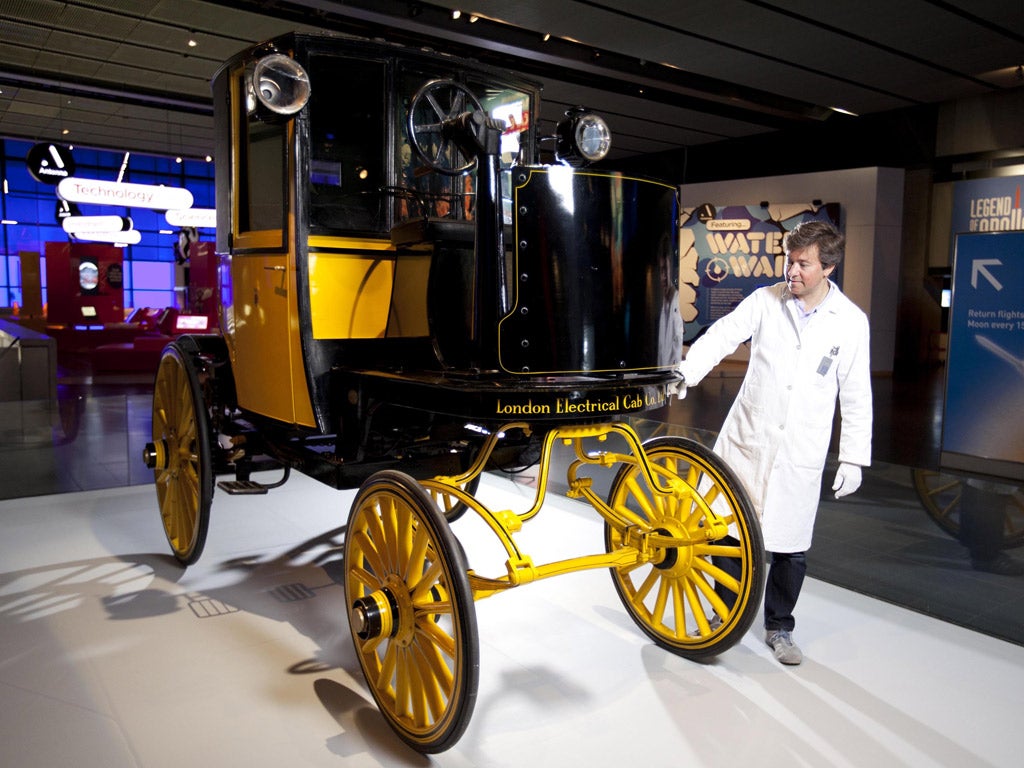Will Dean's Ideas Factory: The electric taxi of the future… from 1897

It might take a brave passenger to ask a cabbie their thoughts on driverless taxi cars. Can a robot ever compete with a black-cab driver's knowledge of The Knowledge? Perhaps. But the idea of futuristic taxis is something that precedes not just the 21st century, but the 20th too, as a new exhibition at London's Science Museum called Climate Changing Stories explains.
And although concepts for a completely driver-free electric taxi have been made – notablly, the Opti Driverless Taxi, mooted for release on to the streets of London in 2025, is one – it wasn't quite possible in 1897.
But what was possible was the Bersey cab, an electrically propelled taxi that ditched the horses and relied on a burgeoning electricity network.
"We think of electric cars as something really futuristic," says Selina Hurley, the exhibition's curator, in a video explaining the Bersey's place there, "but they're actually a lot older than we think."
Around 70 of the Bersey cabs were made and – on a day's charge – they were thought to be able to cover 30 miles, enough for a shift lugging people around London.
Unfortunately for the environment, Walter Bersey's company went bust two years after the cabs hit the streets, under pressure from cabbies worried about their jobs. Something that, if new electric, driverless cabs took off, one can imagine being repeated.
The Bersey cab features alongside stories about wind turbines and the now-rare incandescent light bulb at the exhibition, which runs to 2014.
For more information on the Climate Changing Stories exhibition, visit sciencemuseum.org.uk
QRIP – a digital legacy for those who are six feet under
Some epitaphs can tell you a lot about the person buried beneath the gravestone upon which they are carved. Spike Milligan's "I told you I was ill" probably says as much about the Goon as any lengthy biography, although he did have to have it written in Gaelic to get it past the bureaucracy of the diocese of Chichester.
Similar problems might be encountered by those signing up for a headstone at David Quiring's store in Seattle. As a piece on the decline of QR (quick response) codes in Bloomberg Businessweek explains, Quiring offers, for $75 (£48), to carve one of the barcode-like codes on to your headstone, meaning that visitors, rather than just learning your date of birth and maybe a line on your relatives, can scan the QR code and learn lots about you. As one commentator on the piece put it, "I have a QR code at my husband's grave marker – it is wonderful, I have pictures of him, his obituary, pictures of our travels around the world. He was a remarkable man and now future generations and even our growing current generation will know about their 'Uncle Ed'."
One hopes, for Uncle Ed's memory's sake, that in 100 years, whatever devices those future generations are using can read QR codes.
No cars go, says Bhutan's PM
…And now something else to wind cabbies up. Bhutan, the Himalayan country famous for its gross-national-happiness index, has recently experimented with another charming policy. On 1 June, Prime Minister Jigme Thinley decreed that all Tuesdays in Bhutan's capital city, Thimphu, were to be thenceforth official "pedestrians' days". Meaning that – besides buses, taxis and emergency vehicles (at certain hours) – no cars go. The order explains that it's to give Bhutan's citizens a "chance to contemplate the fragile nature of our precious Himalayan mountain ecology".
It's safe to say that Boris Johnson (scourge of the congestion zone western extension) would not back a similar plan in the UK capital, but it would certainly be a breath of fresh air.
Join our commenting forum
Join thought-provoking conversations, follow other Independent readers and see their replies
Comments
Bookmark popover
Removed from bookmarks